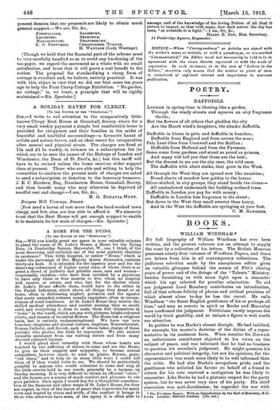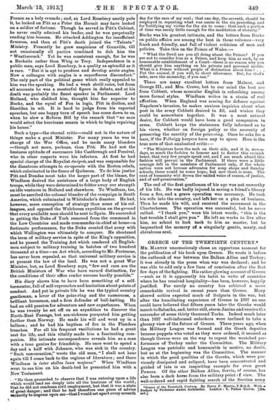BOOKS.
WILLIAM WINDHAM.*
No full biography of William Windham has ever been written, and the present volumes are an attempt to supply the want by a collection of his letters. The British Museum possesses ninety-four volumes of Windham Papers, and there are letters from him in all contemporary collections. The judicious selection made by the anonymous editor gives us valuable glimpses behind the scenes of Pitt's closing years of power and of the doings of the "Talents" Ministry, besides furnishing us with some light upon a character which his age selected for peculiar admiration. To aid our judgment Lord Rosebery contributes an introduction, full of that urbane felicity of phrase and critical precision of which almost alone to-day be has the cecret. He calls Windham " the finest English gentleman of his or perhaps all time," and men so remote in spirit as Burke and Macaulay have confirmed the judgment. Politicians rarely impress the world by their gentility, and so unique a figure is well worth our attention.
In politics he was Burke's closest disciple. He had imbibed, for example, his master's doctrine of the duties of a repre- sentative in its austerest form. When member for Norwich an unfortunate constituent objected to his views on the subject of peace, and was informed that he had no business to question his member's judgment. He might question his character and political integrity, but not his opinions, for the representative was much more likely to be well informed than the critic. He bad also Burke's scrupulous pride, and the gentleman who solicited his favour on behalf of a friend in return for his vote received a castigation he was likely to remember. Like Burke he had a platonic respect for the party system, but he was never very sure of his party. His chief conviction was anti-Jacobinism; he regarded the war with • The Windham Papers. With an Introduction by the Earl of Bosebery, K.O. 2 vols. London: Herbert Jenkins. [32s. net.] France as a holy crusade ; and, as Lord Rosebery neatly puts it, he looked on Pitt as a Peter the Hermit may have looked on a soldier of fortune. Though he served in Pitt's Cabinet, he never really admired his leader, and he was perpetually reading him lessons. He attacked Addington for insufficient firmness, and then at Pitt's death joined the "Talents " Ministry. Presently he grew suspicious of Grenville, till not unnaturally all parties combined to dub him the " Weathercock." Yet he was consistent enough, for he was a Burkeite rather than Whig or Tory. Independence in a public man, says Lord Rosebery, is a quality as splendid as it is rare. " But it is apt to produce and develop acute angles. Now a colleague with angles is a superfluous discomfort." The only part of the political game which really appealed to him was the speaking. He had a Weak shrillsoice, but from all accounts he was a masterful figure in debate, and at his death was probably the finest speaker in Parliament. Lord Holland, who disliked him, thought him far superior to Burke, and the equal of Fox in logic, Pitt in diction, and Sheridan in wit. It is hard to judge from his reported speeches, but one happy turn of speech has come down to us, when be slew a Reform Bill by the remark that "no man would select the hurricane season in which to begin repairing his house."
Such a type—the eternal critic—could not in the nature of things make a good Minister. For many years be was in charge of the War Office, and be made many blunders —though not more, perhaps, than Pitt: He had not the business aptitude of successors like Castlereagh and Percival, who in other respects were his inferiors. At first he had special charge of the Royalist ermigris, and was responsible for the disastrous attempts to co-operate with the Breton rebels, which culminated in the fiasco of Quiberon. To do him justice Pitt and Dundas must take the larger part of the blame, for Windham desired the assistance of a large body of English troops, while they were determined to fritter away our strength on idle ventures in Holland and elsewhere. To Windham, too, must be ascribed the colossal blunder of the campaign in South America, which culminated in W hitelocke's disaster. He had, however, more conception of strategy than some of his col- leagues, and opposed the Walcheren expedition on the ground =that every available man should be sent to Spain. He succeeded in getting the Duke of York removed from the command in the Low Countries and made commander-in-chief at home—a fortunate performance, for the Duke created that army with which Wellington was ultimately to conquer. He shortened the term of military service in spite of the King's opposition, and he passed the Training Act which rendered all English- men subject to military training in batches of two hundred thousand at a time—an Act which, according to Mr. Fortescue, has never been repealed, so that universal military service is at present the law of the land. He was not a great War Minister, but, as Lord Rosebery says, " few and rare are the British Ministers of War who have earned distinction, for the conditions of their office render success hardly possible."
His diary shows him to have been something of a self- tormentor, full of self-reproaches and hesitation about points of conduct. And yet in private life be was the typical country gentleman, a lover of the prize-ring and the racecourse, a brilliant horseman, and a firm defender of bull-baiting. He had an odd passion for adventure and new experiences. When he was twenty he set off on an expedition to discover the North-East Passage, but sea-sickness prevented him getting further than Norway. He made his will and went up in a balloon ; and he had his baptism of fire in the Flanders trenches. For all his frequent vacillations he had a great zest for life, and this vitality made him a fascinating com- panion. His intimate correspondence reveals him as a man with a true genius for friendship. He once went to spend a day and a half with Johnson, who was sick in the country. " Such conversation," wrote the old man, "I shall not hear again till I come back to the regions of literature ; and there Windham is inter stellas Luna snajores." When Windham Went to see him on his death-bed he presented him with a
New Testament.
Ife then proceeded to observe that I was entering upon a life which would lead me deeply into all the business of the world; that he did not condemn civil employment, but that it was a state Of great danger ; and that he had therefore one piece of advice Oarnestly to impress upon me—that I would set apart every seventh day for'the Care of my soul; that'one day, the seventh, should be employed in repenting what was amiss in the six preceding,.and for fortifying my virtue for the six to come : that such a portion of time was surely little enough for the meditation of eternity."
Burke was his greatest intimate, and the letters from Burke on public affairs are among the best in these volumes—very .frank and friendly, and full of violent criticism of men and policies. Take this on the Prince of Wales :-
" What the Devil are you all doing about the Prince? If you are not to consider him as a Prince, and keep him as such, by an honourable establishment of a Court—there is no reason why you should give him anything on his private and personal -merits. What is a Prince without people of distinction about him ? . . . Put the animal, if you will, to short allowance. But, for God's sake, save the monarchy, if you can."
There are many excellent letters from Malone, and George III., and Mrs. Crowe, but to our mind the best aro from Cobbett, whose muscular English is refreshing among more formal styles. Windham writes in a strain of real affection. When England was arming for defence against Napoleon's invasion, he makes anxious inquiries about what post in the army Cobbett desired to fill, and wishes. they could be somewhere together. It was a most natural desire, for Cobbett would have been a good 'companion in arms. Cobbett keeps the statesman fully infoi'med as to his views, whether on foreign policy or the necessity of preserving the sanctity of the prize-ring. Once he asks for a hare, if the Fclbrigg keepers have any to spare. Here is the true note of that .unabashed critic
" The Ministers have the mob on their side, and it is, now-a, days, so much the fashion to honour and to flatter this swinish beast, that very few people speak out, and I am much afraid this fashion will prevail in the Parliament. If there were a little courage left in the members of Parliament only, if the whole nation were not become advocates for soup shops and Sunday schools, there would be some hope; • but now there is none.. The cant of humanity will drown the united voice of reason, of justice, and of self-preservation."
The end of the first gentleman of his age was not unworthy of his life. He was badly injured in saving a friend's library from a fire, and a grave operation was necessary. He took his wife into the country, and left her on a plea of business. Then he made his will, and received the sacrament in the Charterhouse. The operation was successful, but he never rallied. "I thank you," were his latest words; "this is the last trouble I shall give you." He left no works to live after him, no school to look back to him as master, but lie bequeathed the memory of a singularly gentle, manly, and chivalrous soul.















































 Previous page
Previous page